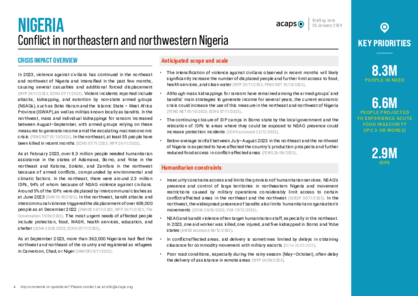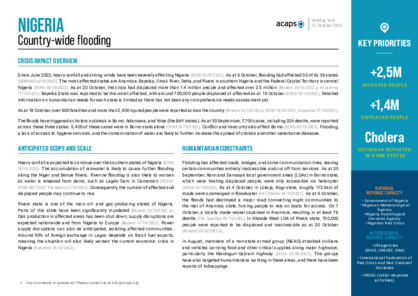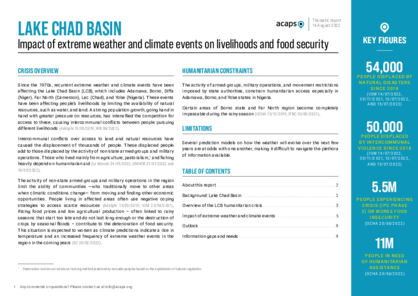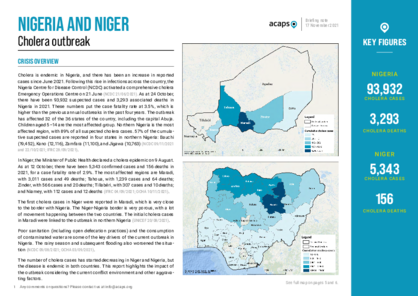Latest updates on country situation
12 September 2024
On 10 September 2024, severe flash flooding in Maiduguri city triggered the collapse of the Alau Dam, affecting over 239,000 people and displacing nearly 50,000 across Bulabulin, Fori, Galtimari, and Gwange areas (Borno state). The flooding has disrupted critical supply chains and hindered access to schools, healthcare facilities, and markets in many parts of Borno. Immediate needs for the affected include food, NFIs, shelter, and clean water. (OCHA 10/09/2024, ECHO 11/09/2024, CNN 11/09/2024)
03 September 2024
By 2 September 2024, heavy rains had affected over 500,000 people across 28 of Nigeria’s 36 states, including Bauchi, Jigawa, Niger, Sokoto, and Zamfara. The floods have displaced 205,000 people, killed 170, damaged 76,000 houses, and destroyed over 106,089 hectares of farmland. (IRC 02/09/2024, VOA 28/08/2024)
20 August 2024
On 8 August 2024, heavy rainfall triggered severe flooding that devastated the entire community of Sabon Gari in Katagum local government area, Bauchi. The disaster claimed three lives, destroyed over 600 homes, and affected more than 800 people, leaving the entire community displaced. The flooding also wiped out over 300 livestock and ravaged thousands of hectares of farmland, severely disrupting livelihoods and cutting off the community's access to clean water. The impact hit infrastructure, including the road connecting Azare to Giade and a portion of the Azare-Jama'are Federal dual carriageway along the Kano-Maiduguri Expressway, which was completely washed away. Some displaced residents have been relocated to Gida Dubu. The affected community urgently needs immediate support, including food, NFIs, medical care, and WASH services. (IFRC/Nigerian Red Cross Society 14/08/2024, Zawya 13/08/2024)
30 July 2024
On 22 July 22 2024, heavy rainfall caused a flash flood in Dikwa and Mafa local government areas, Borno state, damaging nearly 260 shelters and affecting more than 4,000 individuals. Urgent needs include food, NFIs, shelter, and WASH services. (IOM 27/07/2024, Punch 17/07/2024)
15 May 2024
In the northeastern states of Borno, Adamawa, and Yobe (commonly referred to as the BAY states), approximately 4.8 million people are expected to face severe hunger during the 2023 lean season (June–August) unless immediate interventions are implemented. This marks an 11.6% increase from the 4.3 million people projected to experience food insecurity during the same period in 2023. Prolonged conflict and dry spells have worsened the food and nutrition crisis in the BAY states. Recent nutrition surveillance data shows that 16 out of the 62 local government areas in these states are already experiencing critical nutrition situations even before the peak of the lean season. The worsening food security situation is driven by escalating inflation, insecurity (including insurgency, kidnapping, and banditry), and rising fuel prices, compounded by climate-related shocks nationwide. Heightened insecurity has forced farmers to abandon their farms, further deepening the crisis. (FSC 02/04/2024, UNCT Nigeria/OCHA 14/05/2024)
11 March 2024
On 7 March 2024, over 280 students were abducted from a school in Kuriga, Kaduna State, marking the third such incident in a week. On 9 March, 15 students were kidnapped in Gidan Bakuso village, Sokoto State, raising concerns in the North West. Rescue efforts are hindered by inaccessible roads. Over 200 individuals (predominantly women and children) were abducted in Borno State, allegedly by Boko Haram in early March. These distressing events highlight critical protection and education concerns, as the security gaps exploited by kidnappers jeopardise the safety of children and women and disrupt the educational environment. (The Guardian 10/03/2024, CNN 08/03/2024, APNews 09/03/2024)
13 February 2024
26.5 million people are projected to face food insecurity in 2024 in 26 assessed states of Nigeria (out of 36). The main drivers of food insecurity include the change in seasonal patterns affecting agriculture; conflict and insecurity; poverty; and increasing inflation affecting people's access to food. On 6 February, food inflation triggered protests in central Niger and northwest Kano states. As at December 2023, food inflation reached 33.93% – an increase from 23.75% in December 2022. Poor food consumption resulted in acute malnutrition among 4.41 million children, including 1.04 million severely malnourished in northeast and northwest Nigeria. Persistent food insecurity and poverty have also aggravated various protection concerns, compelling people to resort to negative coping mechanisms such as engaging in survival sex, begging, and child labour.
(OCHA 13/11/2023, IPC 17/10/2023, Government of Nigeria 06/02/2024)
current crises
in
Nigeria
These crises have been identified through the INFORM Severity Index, a tool for measuring and comparing the severity of humanitarian crises globally.
NGA001 - Complex crisis
Last updated 27/08/2024
Drivers
Conflict
Displacement
Violence
Epidemic
Floods
Crisis level
Country
Severity level
4.1 Very High
Access constraints
5.0
NGA003 - Middle Belt
Last updated 27/08/2024
Drivers
Violence
Conflict
Crisis level
Country
Severity level
3.2 High
Access constraints
2.0
NGA004 - Lake Chad basin crisis
Last updated 27/08/2024
Drivers
Conflict
Displacement
Crisis level
Country
Severity level
4.2 Very High
Access constraints
5.0
NGA007 - Northwest Banditry
Last updated 27/08/2024
Drivers
Violence
Displacement
Crisis level
Country
Severity level
3.6 High
Access constraints
3.0
NGA008 - Cameroonian Refugees
Last updated 27/08/2024
Drivers
Displacement
Crisis level
Country
Severity level
2 Low
Access constraints
2.0
REG001 - Lake Chad basin regional crisis
Last updated 28/08/2024
Drivers
Crisis level
Regional
Severity level
4.3 Very High
Access constraints
4.0
Analysis products
on
Nigeria
28 May 2024
Global increase of cholera: aggravated by vaccine shortage and El Niño
DOCUMENT / PDF / 341 KB
This report highlights the key contributing factors and aggravating conditions that can increase the global prevalence of cholera, focusing particularly on the impact of the global OCV shortage that is heightening humanitarian needs among affected populations and those vulnerable to spread.
Attached resources
03 January 2024
Nigeria: conflict in the northeast and northwest
DOCUMENT / PDF / 201 KB
Violent incidents reported include attacks, kidnapping, and extortion by non-state armed groups (NSAGs), such as Boko Haram and the Islamic State – West Africa Province (ISWAP), as well as militias known locally as bandits.
21 October 2022
Nigeria: country-wide flooding
DOCUMENT / PDF / 1 MB
Since June 2022, heavy rainfall and strong winds have been severely affecting Nigeria. As at 6 October, flooding had affected 33 of its 36 states. As at 20 October, the crisis had displaced more than 1.4 million people and affected over 2.5 million. The floods have triggered a cholera outbreak in Borno, Adamawa, and Yobe.
17 August 2022
Lake Chad Basin: Impact of extreme weather & climate events on food security
DOCUMENT / PDF / 1 MB
This report aims to explore the impact of extreme weather and climate events on the humanitarian situation in the Lake Chad Basin. Since the 1970s in West and Central Africa, river floods and agricultural and ecological droughts have been increasing while average rainfall has been decreasing. These phenomena have an impact on availability of resources and land, and consequently on the economic and living conditions of the regions’ populations.






